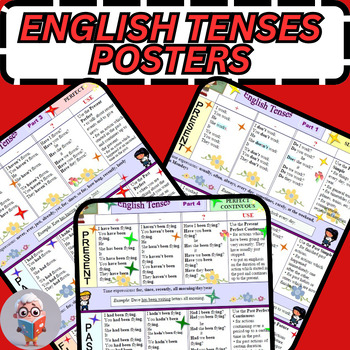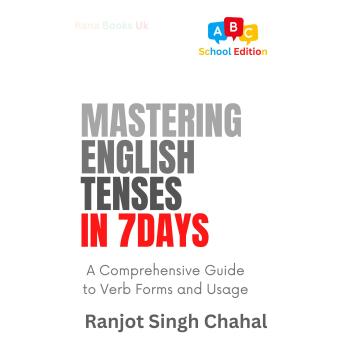Mastering English Tenses: A Complete Information with Guidelines and Examples
Associated Articles: Mastering English Tenses: A Complete Information with Guidelines and Examples
Introduction
On this auspicious event, we’re delighted to delve into the intriguing subject associated to Mastering English Tenses: A Complete Information with Guidelines and Examples. Let’s weave attention-grabbing info and supply recent views to the readers.
Desk of Content material
Mastering English Tenses: A Complete Information with Guidelines and Examples

English tenses could be a daunting problem for learners, however understanding their construction and utilization is essential for efficient communication. This text offers a complete information to English tenses, together with an in depth chart and quite a few examples as an instance their utility. We’ll cowl the 12 principal tenses, exploring their formation, utilization, and refined variations.
Understanding Tense:
Tense refers back to the grammatical expression of time in a sentence. It signifies when an motion or state of being occurred, is happening, or will happen. English tenses are shaped utilizing auxiliary verbs (serving to verbs) like be, have, and do, mixed with the primary verb’s completely different kinds (current, previous, previous participle).
The Twelve Predominant Tenses:
The next chart outlines the twelve principal tenses, their formation, and typical utilization. Keep in mind that this can be a simplified illustration, and nuanced makes use of exist inside every tense.
| Tense | Affirmative Sentence Construction | Adverse Sentence Construction | Interrogative Sentence Construction | Instance | Utilization |
|---|---|---|---|---|---|
| Easy Current | Topic + Base Verb (s/es for third individual singular) | Topic + do/does + not + Base Verb | Do/Does + Topic + Base Verb? | I eat breakfast daily. | Habits, routines, common truths, everlasting states |
| Current Steady | Topic + am/is/are + Verb-ing | Topic + am/is/are + not + Verb-ing | Am/Is/Are + Topic + Verb-ing? | She is singing a music. | Actions taking place now, momentary actions, future preparations |
| Current Good | Topic + have/has + Previous Participle | Topic + have/has + not + Previous Participle | Have/Has + Topic + Previous Participle? | I’ve completed my work. | Actions accomplished at an unspecified time, actions with ongoing outcomes |
| Current Good Steady | Topic + have/has + been + Verb-ing | Topic + have/has + not + been + Verb-ing | Have/Has + Topic + been + Verb-ing? | They’ve been taking part in soccer. | Actions persevering with from the previous till now, emphasizing length |
| Easy Previous | Topic + Previous Easy Verb | Topic + did + not + Base Verb | Did + Topic + Base Verb? | He went to the park yesterday. | Accomplished actions up to now, previous habits, previous states |
| Previous Steady | Topic + was/have been + Verb-ing | Topic + was/have been + not + Verb-ing | Was/Had been + Topic + Verb-ing? | They have been watching TV. | Actions in progress at a selected time up to now, interrupted actions |
| Previous Good | Topic + had + Previous Participle | Topic + had + not + Previous Participle | Had + Topic + Previous Participle? | She had eaten earlier than I arrived. | Actions accomplished earlier than one other motion up to now |
| Previous Good Steady | Topic + had + been + Verb-ing | Topic + had + not + been + Verb-ing | Had + Topic + been + Verb-ing? | We had been ready for hours. | Actions persevering with up to a degree up to now, emphasizing length |
| Easy Future | Topic + will/shall + Base Verb | Topic + will/shall + not + Base Verb | Will/Shall + Topic + Base Verb? | I’ll go to the cinema. | Future actions, predictions, guarantees, spontaneous selections |
| Future Steady | Topic + will/shall + be + Verb-ing | Topic + will/shall + not + be + Verb-ing | Will/Shall + Topic + be + Verb-ing? | They are going to be taking part in tomorrow. | Actions in progress at a selected time sooner or later |
| Future Good | Topic + will/shall + have + Previous Participle | Topic + will/shall + not + have + Previous Participle | Will/Shall + Topic + have + Previous Participle? | She can have completed by midday. | Actions accomplished earlier than a selected time sooner or later |
| Future Good Steady | Topic + will/shall + have + been + Verb-ing | Topic + will/shall + not + have + been + Verb-ing | Will/Shall + Topic + have + been + Verb-ing? | He can have been working for ten years. | Actions persevering with as much as a selected time sooner or later, emphasizing length |
Detailed Examples and Explanations:
Let’s delve deeper into some tenses with extra complicated examples:
1. Current Good vs. Easy Previous:
- Current Good: Focuses on the results of a previous motion that’s nonetheless related to the current. "I’ve lived in London for 5 years" (I nonetheless stay there).
- Easy Previous: Focuses on a accomplished motion up to now. "I lived in London for 5 years" (I do not stay there anymore).
2. Current Steady vs. Current Good Steady:
- Current Steady: Describes an motion taking place now. "I’m writing an e mail."
- Current Good Steady: Describes an motion that began up to now and continues to the current, emphasizing the length. "I’ve been scripting this e mail for 2 hours."
3. Previous Good vs. Easy Previous:
- Easy Previous: Describes an motion accomplished up to now. "I ate dinner."
- Previous Good: Describes an motion accomplished earlier than one other motion up to now. "I had eaten dinner earlier than he arrived."
4. Future Easy vs. Future Steady:
- Future Easy: Describes a easy future motion. "I’ll go to the occasion."
- Future Steady: Describes an motion that will likely be in progress at a selected time sooner or later. "I will likely be finding out at 8 pm tomorrow."
5. Utilizing ‘Used To’ and ‘Would’:
These are sometimes confused with previous tenses however symbolize habits or states up to now which might be not true.
- Used to: For habits and states. "I used to smoke." (I do not anymore)
- Would: For repeated actions up to now. "We might go to the seaside each summer time." (We do not anymore)
Widespread Errors and Nuances:
- Overusing the Current Steady: Whereas versatile, keep away from utilizing it for states (e.g., "I’m realizing the reply" ought to be "I do know the reply").
- Incorrect use of Previous Good: Guarantee the 2 actions are clearly linked in time; the previous excellent all the time refers back to the earlier motion.
- Confusion with ‘Will’ and ‘Going to’: ‘Going to’ suggests a plan or intention, whereas ‘will’ is extra spontaneous. "I’m going to go to my dad and mom" (deliberate), "I’ll assist you" (spontaneous supply).
Superior Tense Utilization:
Mastering English tenses entails understanding refined nuances and contextual utilization. For instance:
- Narrative tenses: Utilizing a mix of previous easy, previous steady, and previous excellent to create a dynamic and fascinating story.
- Hypothetical conditions: Using conditional tenses (e.g., "If I gained the lottery, I might journey the world").
- Formal vs. casual language: Sure tenses are extra frequent in formal writing than in casual speech.
Conclusion:
Understanding English tenses is a journey, not a vacation spot. Constant follow, cautious remark of utilization in genuine supplies, and a spotlight to element are key to mastering this side of English grammar. This text serves as a foundational information; additional exploration by follow workouts and immersion within the language will solidify your understanding and improve your fluency. Keep in mind to seek the advice of grammar assets and search suggestions in your writing and chatting with refine your expertise. With dedication and energy, you possibly can confidently navigate the complexities of English tenses and talk successfully.


.png)


.png)


Closure
Thus, we hope this text has offered worthwhile insights into Mastering English Tenses: A Complete Information with Guidelines and Examples. We thanks for taking the time to learn this text. See you in our subsequent article!